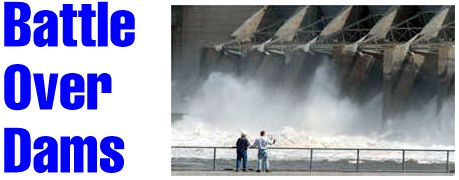forum
library
tutorial
contact

New Study Says Breaching Would Bring Economic Benefits
by The Associated PressTri-City Herald, November 5, 1999
|
the film forum library tutorial contact |

|
New Study Says Breaching Would Bring Economic Benefitsby The Associated PressTri-City Herald, November 5, 1999 |

SEATTLE - A private study for Northwest environmental groups concludes that bypassing four Lower Snake River dams to help migrating salmon would lead to long-term economic benefits for the Northwest.
"And the South will rise again," scoffed Bruce Lovelin of the Columbia River Alliance of irrigators, barge operators and power users that oppose breaching the dams.
Clearly, it's a touchy issue.
The report by the Eugene, Ore.-based economic consulting firm ECONorthwest is based on preliminary data gathered by the Army Corps of Engineers' Drawdown Regional Economic Workgroup, or DREW. It was sponsored by Portland-based Trout Unlimited and the Earthjustice Legal Defense Fund's Seattle office.
"DREW to date has seriously underestimated the economic benefits of bypassing the dams," said a news release accompanying the report.
"That is preliminary data they're looking at," said Nola Conway in the Corps' Walla Walla office, who is overseeing the Corps study due in December.
There is a lot of effort under way now by groups both for and against the breaching, Conway said.
"We're asking them, as we're asking the region, to wait for our release of the draft Environmental Impact Statement," she said, which will be followed by collection of comment before making a final recommendation next year.
"We welcome input, but it's not time yet."
Lovelin agreed.
"This report is effectively chastising the Corps for a report that they have not yet published," he said. "I think they're kind of jumping the gun. ... We've all been participating in this process for a couple of years."
The National Marine Fisheries Service will assess the Corps' study from a biological perspective and recommend a course of action to best help salmon as they migrate between the Pacific Ocean and their spawning grounds in the Snake-Columbia river system.
The options are leaving things as they are; improving dam operation as it affects salmon; and removing the dams' earthen portions, which block about a third of the river flow at each site.
The question is, "Will breaching make any difference to salmon recovery? Are there other things we can do?" said spokesman Brian Gorman in NMFS' Seattle office.
"It comes as a surprise to nobody that this is an extremely sensitive issue," he said. "Whatever we recommended had sure better be supported by some defensible science and some intelligent policy position. We'll get sued no matter what we say or do. We've got to make this isn't a back-of-the-envelope decision."
Breaching of the four dams has been under consideration since 1995. Interest has intensified as the region's faltering salmon runs approach the point of no return. More than a dozen runs have been granted federal protection under the Endangered Species Act, which has the region braced for restrictions in land and water use.
According to the ECONorthwest study, removing the dams would:
learn more on topics covered in the film
see the video
read the script
learn the songs
discussion forum
